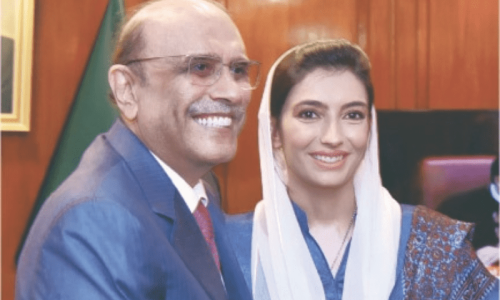ISLAMABAD, Dec 19: Economic experts told a conference here on Monday that low standards of vocational, creative and cognitive skills had resulted in huge losses to Pakistan in output, exports and employment and left it far behind in the race for knowledge-based economy.
The three-day Annual General Meeting and Conference of Pakistan Society of Development Economists (PSDE) is exploring “the dark aspects of Pakistan economy” in the light of research papers of some well-known national and international economic experts.
“Pakistan has remained in a low-level skills trap for too long. If it wants to move to the knowledge economy then it must break up this trap,” said Dr A.R. Kemal, president of PSDE and director of the Pakistan Institute of Development Economics (PIDE).
In his keynote address Dr Attaur Rehman, adviser to the prime minister on technology, suggested that Pakistan learn from the experience of China which adopted the strategy of massive human resource development to become the world’s fastest growing economy.
Prime Minister Shaukat Aziz opened the conference, which has been organized by the PIDE in collaboration with the British Department for International Development (DFID), the German Foundation Friedrich Ebert Stiftung (FES), the National Reconstruction Bureau (NRB), the United Nations Fund for Population Activities (UNFPA), National Bank of Pakistan (NBP) and Zarai Traqiati Bank Limited (ZTBL).
Dr Kemal said cost-effective and demand-driven investment in education and skill was required but it alone would not suffice “until institutions were developed that recognize the value of investing in people and provide dignity, respect and fair deal for working men and women”.
In Pakistan, he said, training of various skills was imparted through polytechnics, vocational training centres, apprenticeship schemes, various training and vocational institutions and the Ustad-Shagird system in the informal sector.
However, the total 546 technical and vocational institutions had the capacity to produce only 200,000 skilled people every year which was nothing compared to the country’s population.
Besides, people in these institutions were not trained in accordance with the demand and requisite quality, he pointed out.
Dr Kemal said Technical Education and Vocational Training Authority (TEVTA) has been set up in the Punjab and similar organizations were being set up in the other provinces as well, however, the authority should not just focus on enhancing the enrolments, they must provide good quality relevant training because it was a common impression that technical training in Pakistan had little relevance to industry.
The chairman Higher Education Commission, Dr Attaur Rahman, said that science and technology had widened gape between the rich and the poor. “However, this situation can be improved through education and skill-development,” he added.
Dr Rahman said that socio-economic development was no longer dependent on natural resources, as the vision for the future was knowledge-driven. In this scenario the key challenge for Pakistan was to become a significant competitor in the global knowledge-based economy.
“Pakistan is blessed with a huge pool of creativity as it has 100 million of population below the age of 25. However, the challenge is to empower this population with quality education and skills and provide them opportunities to contribute to the process of socio-economic development,” HEC chief said.
In the morning session, Prof M. Ali Khan delivered the Iqbal Memorial lecture. Prof E. Evenson, Department of Economics, the Johns Hopkins University, Baltimore, USA, chaired the session.
Prof Khan said different individuals obtained very unequal profits from virtually equivalent economic or cultural capital, depending on the extent to which they could mobilize by proxy the capital of a group.
In the first regular session of the conference, 12 papers were presented and discussed in the areas of skill development, population and gender issues, agriculture, and exchange rate.
Former finance minister, Sartaj Aziz, who chaired the afternoon’s session, underlined the need for competitiveness for successes in this age of globalization, which depended on technology and skill-development.
Pakistan had to go a long way in this regard, he said. “We need to carry out, both industry-wise and locality-wise, research to identify skill mismatch and requirements of different industries like leather, textile etc located in different areas”.
Mr Aziz said the enrolment in vocational institutes was very low in Pakistan and suggested to convert high schools into vocational training institutes to overcome this problem rather than setting up new ones.
Dr Karen Wagner of the University for Technology and Economics, Berlin, Germany, said that cross national comparisons were a useful concept as they helped to analyse the functioning of different national systems and explained what outcomes could be achieved by different means and inputs. They did not only identify differences between systems but also how systems worked.















































Dear visitor, the comments section is undergoing an overhaul and will return soon.